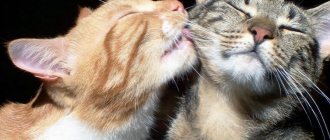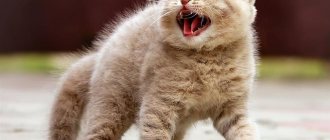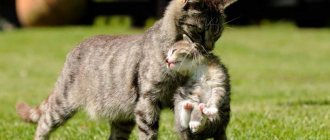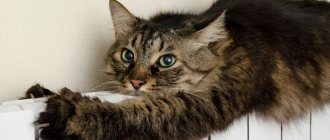The domestic cat differs from the wild one in having a more docile character. He easily makes contact with people and gladly allows himself to be taken care of. But sometimes it still shows a certain wildness in its behavior, which is expressed in the fact that the cat growls and hisses at the members of the family in which it lives. And if at first this behavior even slightly amuses some owners, then with regular and frequent manifestation of aggression in this way, any owner begins to think about its causes and possible consequences. Especially if there is a small child in the family.
Fear as a reason for growling
Hissing and growling associated with fear appears due to insufficient attention to the kitten. If the kitten rarely had contact with people, did not receive proper attention from them, or even suffered insults or even beatings from them, then fear of people will accompany an already adult cat. To understand that it was fear that caused the growling, pay attention to the following factors:
- a cat can rush at its owners in the presence of a certain stimulus, real or imaginary;
- if a pet is “cornered”, it hisses and growls much more intensely;
- aggression is accompanied by appropriate warning postures;
- the pet can connect its paw swings to the growl;
- when the situation comes to its logical end, the animal begins to relieve stress, for example, by licking the fur.
You cannot punish a cat for such behavior, since with such tactics it will always expect bad things from a person.
Rabies
Although we mentioned in this article that the reasons for a cat attack can be fear or pain, it is worth looking at another reason for aggression: rabies.
Rabies is a fatal disease that can be transmitted from one animal to another. Once the virus reaches the brain, it begins to affect behavior. In many cases, one of the changes is increased aggressiveness.
In order to protect yourself and your animal from this pathology, do not forget about vaccinating your pets, and also do not let your purrs walk on the street, where they can be bitten by a rabid animal.
If you notice that an unvaccinated cat that has free access to the outdoors or is in contact with animals that walk outside becomes very aggressive for no apparent reason, contact your veterinarian immediately!
Frustration
Frustration is a state in which a pet's needs are not met. Scientists believe that this disorder occurs if the kitten is not weaned off cat milk naturally.
As a result, the cat is not able to get its own food. He expects some kind of reward and growls if he doesn't get it. How to recognize this reason:
- the cat hisses at the owner, even if he trusts him;
- the pet growls if in any situation he did not get the desired reward;
- the cat did not receive mother's milk;
- The cat screams loudly and rushes around the door.
This also manifests itself when the owner does not serve food quickly enough, opens the front door, or simply moves away from the pet.
Unmet cat needs
Human-raised cats may complain when their needs are not met. The hissing begins, no, no, and the owner is in no hurry to fulfill some cat’s desire. For example, a cat in the kitchen is waiting for the bowl to be filled with food, but the head (at home) is in no hurry. Then the plaintive meow turns into a menacing hiss. Is it possible that the kitty curls around the owner’s legs in every possible way, waiting for the owner to stroke it another time, while he is busy with something else? Then the sweet and kind animal turns into an irritated hissing fury.
In similar situations, nothing can be done, because the cat behaves this way due to lack of good upbringing.
Predator instinct
Everyone is familiar with the game when the owner plays with a kitten, moving his hand or foot under the blanket. It is at this moment that predatory behavior awakens. Only a person perceives this situation as a game, and the pet learns to hunt with all responsibility. This reason is easy to recognize:
- a cat attacks a person from an ambush;
- When you shout back at the cat, the pet begins to behave even more aggressively.
When this behavior goes too far, it becomes a problem.
INTERESTING TO KNOW: Home remedies for fleas on cats
Possessive instinct
A cat's instinct of ownership is much stronger than a human's. A pet can growl if it wants to show itself as the master of the situation. Even if the animal is the only one in the house, it is driven by this instinct at the genetic level.
To understand that it is precisely this reason that provokes the growl, just look at the circumstances under which the pet growls.
If he protects food or a favorite toy, it means that the possessive instinct has begun to play in him. What to do in this situation? First, you need to move away from the cat to a safe distance, since growling and hissing are the last warning before an attack. The cat may bite or scratch you.
Being in a team
If a cat does not like to be in large crowds of people, play with children or roam from hand to hand, it is better to isolate it in the next room. Some animals simply cannot stand large companies and warn not to be touched by growling.
You should not pick up the animal, stroke it, or allow children to play with it, since the cat can also warn of an attack, and its hissing or growling can very soon turn into scratching.
What does hissing mean?
Recognizing the language of animals is not that difficult. A hiss on it indicates a warning. Felines try to avoid conflict and set boundaries with body language and sounds. The hissing cat says that there is no need to mess with a dangerous animal.
Hissing can also mean that the cat is scared of someone. This reaction happens to all living beings, including kittens, especially if the kids irritate their mother with their actions. The hissing cat is scared, but will fight back if necessary.
Why was hiss selected? Animal psychologists are of the opinion that felines imitate snakes as animals that frighten many. Thus, the cat gets the opportunity to threaten with the expectation that the person or animal will bypass.
Other reasons
The cause of aggressive behavior may well be pregnancy. This is a natural phenomenon; in nature, a pregnant cat always protects her unborn kittens. Try to let the animal know that it can trust you. Soon the cat will understand this and stop behaving aggressively. Inappropriate behavior may persist after the birth of the babies, but when the pet understands that the kittens are not in danger, the aggression will disappear.
Illness can also cause nervousness and aggression. When your pet is in pain, he doesn't want to be bothered. This is why a cat may hiss or growl when you pick it up. Don’t guess what disease has afflicted your pet; take him to the vet.
To understand what role illness plays in growling and sudden hissing, take a closer look at the cat’s behavior. He may be nervous, apathetic, eat and sleep poorly, lick his fur, or try to eliminate the cause of pain with his teeth.
Also sometimes the cat’s behavior after anesthesia is inappropriate. This is normal, since the pet does not perceive the surrounding reality for some time and is simply afraid of it. Try to calm the cat down, let him know that you are nearby, speak kind words and pet him.
INTERESTING TO KNOW: How to get rid of the smell of cat urine in shoes
Signs
Typically, a cat hisses when it is afraid of other animals or people. But traditionally it is believed that in this way she shows aggression, she can even rush and attack.
When an animal makes such sounds, it becomes tense, bends its back, tail, and may press its ears. What does a hissing cat usually look like?
- His fur instantly stops being tousled, it seems that it has turned from smooth to fluffy, voluminous. Visually, the cat even looks larger at such a moment.
- When a cat gets angry, his back arches. This pose is a signal that the animal can and will rush at the offender or someone who, in his opinion, poses a danger.
- The ears are flattened for a reason. They talk about distrust of those around them. It is also a kind of protection for the head from injury.
- An expressive look conveys all the emotions of a cat - courage, aggressiveness, determination. Meowing may also be heard along with the hissing, but it does not make the disheveled cat any cuter. On the contrary, the sounds complement the appearance and confirm the readiness to stand up for oneself and even rush at a person.
The owner of the animal, having studied its habits, will be able to figure out when a cat hisses because of a sense of danger, and when because of a feeling of aggression.
Pet injures its own tail
Sometimes it happens that a cat bites its tail, and when trying to prevent it, it begins to hiss and growl. This is dangerous because in some cases this behavior leads to further tail amputation. There may be several reasons for this disorder:
- the owners moved to a new place of residence;
- a new resident has appeared in the family;
- they began to pay less attention to the cat;
- The pet has experienced psychological trauma.
Often a cat may chew its tail at night when all family members are sleeping.
How to respond to a growl
It is important to follow a list of rules that will allow you to pacify your pet and eliminate conflict:
- The cat's character is designed in such a way that you are unlikely to be able to pacify your pet right away. Wait a few minutes for the animal to calm down.
- When a certain amount of time has passed and the pet has completely calmed down, try to establish contact with him. Pet him, talk to him, give him a treat.
- If the reason is that the animal is in pain, take him to the vet immediately, as pain may indicate the severity of the disease.
It happens that a cat simply has an aggressive character, and nothing can be done about it. In this case, do not try to change your pet, but adapt to it. He loves you, he just can’t show it with affection and purring. Understand him and accept him for who he is.
The cat needs to find food
If a mother cat and her babies spend most of their time outdoors, sooner or later she will understand that it is time to look for food - both for herself and for her children. It is much easier to look for something edible without being distracted and without making noise, which kittens inevitably make due to their “inexperience.” Mom knows she can bring something home if her kids don't scare off the prey. She will turn around and hiss at any kittens that try to follow her. Of course, they are unlikely to be ready for this and are likely to get scared, and then, stumbling, return to their place, waiting for their mother.
How to stop an animal from growling
If growling and aggressive behavior are inherent in the character of a cat, then it is unlikely to be weaned from it. However, if the reason lies elsewhere, then it should simply be eliminated. If you cannot do this yourself, you need to seek help from a specialist.
Important: you should not shout at the cat or humiliate it, much less hit it; this may not have the effect you expect, and the pet will become even more aggressive.
Kitten growl
The case of the little kitten requires a separate description. The baby has to learn a lot of new things about the world around him, but for now he knows nothing and experiences a lot of emotions when looking at the surrounding reality.
Watch your baby, try to show him that you are there for him, that you support him in everything. Kittens can be afraid of the unknown, while hissing, growling and fluffing their tails. They may try to show themselves capable of attack or defense in order to be taken into account.
However, establish contact with the kitten gradually; you should not immediately shower it with great attention, this can lead to stress, as a result of which mental trauma will occur, and the baby will simply become even more aggressive. This may continue in the future, for life.
Thus, the growling of an animal is a common phenomenon that many owners encounter. Understand its reasons, and the cat will thank you with affection and devotion.











